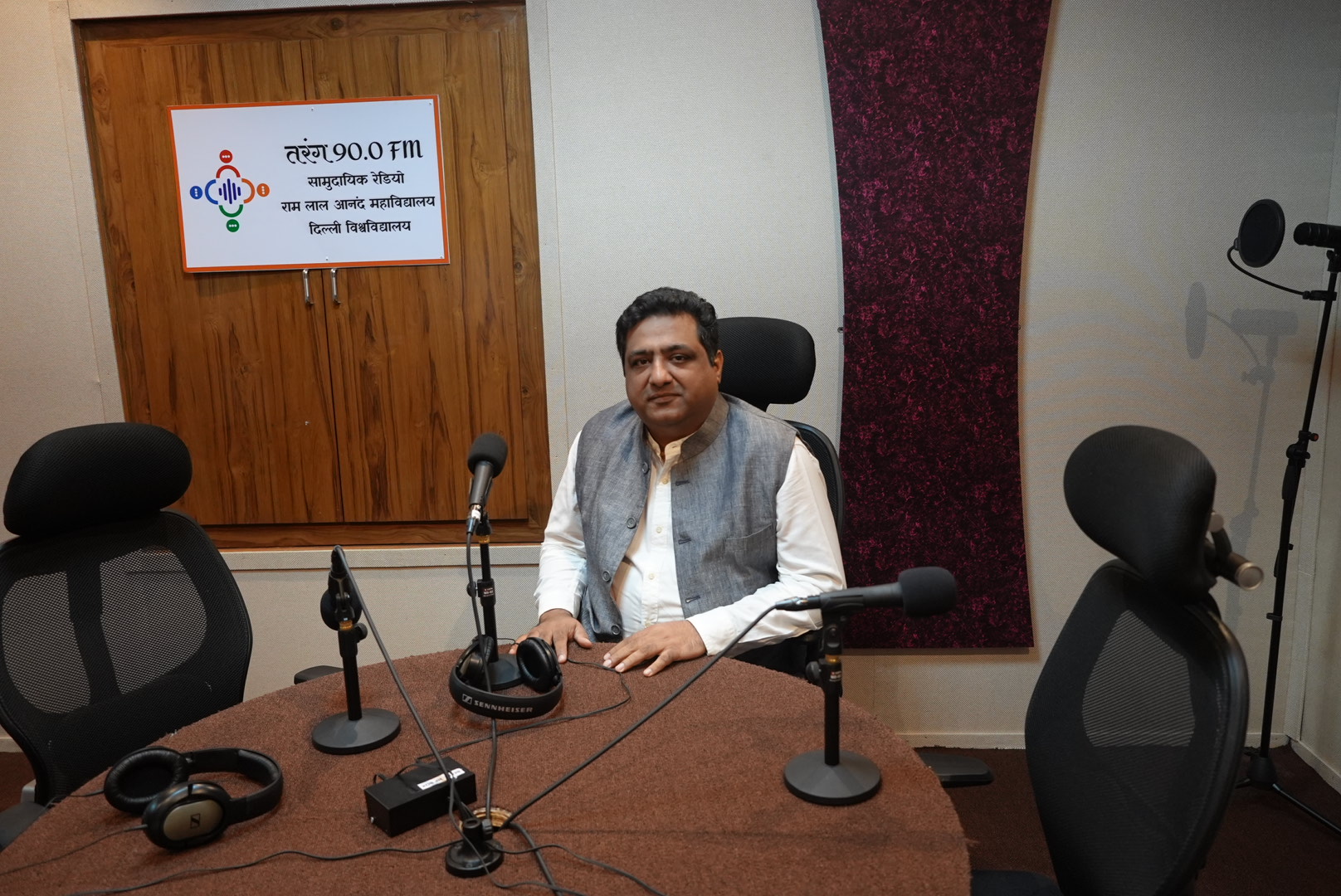Tushar Kansal, Founder CEO, Kansaltancy Ventures with Inner Review magazine
About Tushar Kansal
Linktree - https://linktr.ee/tusharkansal
Corporate website - https://www.Kansaltancy.com
LinkedIn - https://www.linkedin.com/in/tusharkansal/
Expert Speaking website - https://www.TusharKansal.com
YouTube - https://www.youtube.com/c/TusharKansal
YouTube Playlist Talks/ Events/ Shows - https://www.youtube.com/playlist?list=PLgrWugpMQEmY8UWwJOEiZ1ICcsSD9tgBk
YouTube playlist VCTV (Venture Capital Tv) shows - https://www.youtube.com/playlist?list=PLgrWugpMQEmbyMzpcsJQkYYDIu6JxiZUh
YouTube playlist VCTV (Har Ghar Startup channel) shows –
https://www.youtube.com/playlist?list=PLgrWugpMQEmaLlW0abg4f-LtqIXZoPXoX
Founder/CEO of Kansaltancy Ventures - Tushar is an accomplished professional, a "Thought Leader," and a "Thought Influencer."
His goal is to assist change-makers through venture capital and strategic services, utilizing his extensive network of over 450 Investors/ VC Fund connections to engage in sector-agnostic global deals, with typical deal sizes ranging from USD 1-100 million.
Over the years, Tushar has supported Startups and Companies in various Tech and non-Tech sectors, as evidenced by over 80 recommendations on LinkedIn.
Tushar currently serves as a Venture Advisor at Loyal VC, the INSEAD-led Canadian VC Fund, with a portfolio of over 350 investments across 15 sectors in more than 60 countries.
He acts as a mentor and speaker at the entrepreneurship cells of prestigious institutions such as IITs, IIMs, and globally renowned establishments, specializing in financial and business advisory.
His expert insights are featured by prominent business news channels and publications, including CNN-News18, VCTV (Venture Capital TV), Business World, Business & Economy, Qrius, and Digital Market Asia. With over 300 talks, you can find more about him by searching on Google or checking YouTube.
Tushar possesses experience spanning various sectors, from Venture Capital (Brand Capital) and Big 4 consulting (Deloitte & Touche) to his role as CFO of MTS India, the LSE-listed Sistema's India unit, and the USD 200 billion Guggenheim Partners-owned company (DLI). He successfully executed numerous venture capital deals during his tenure at Deloitte and Brand Cap, raising USD 2.5 billion for MTS India.
He completed executive education at Harvard Business School, holds an MBA in Finance from the University of Delhi, and earned a B.Tech from "The Technological Institute of Textile & Sciences," affiliated with the “Textile Institute Manchester, UK,” and a part of the renowned industrial and educational conglomerate in India, “The Birla Group.”
Kansaltancy Ventures received the "Best Startup Supporter" award at the "IndiaFirst Tech Startup Conclave 2002" by the "All India Council for Robotics & Automation - AICRA," for extensive work in the STEM field and was presented by Dr. Kiran Bedi. Tushar was honored as the "Business Leader of the Year in Investment Management" by the "Asian African Chamber of Commerce & Industry. “Best Investment Bank in Venture Capital" by Great Companies. "Entrepreneur of the Year" by Business Connect magazine.
Questions & Answers
Can you please share details about your professional background?
With executive education from Harvard Business School, an MBA in Finance from the University of Delhi, and an engineering background, I've held various responsibilities at Deloitte & Touche, Times of India's Brand Capital, Sistema's MTS India, and served as the CFO of a Guggenheim-owned company, DLI. Over the past decade, I've been in leadership roles, driving business for both large companies and as an entrepreneur.
During my time at Deloitte, I played a key role in executing private equity assignments, valuations, and Financial Advisory services. At Brand Capital, I was involved in investing approximately INR 100 crores across companies. As the head of the Debt division at MTS India, I successfully raised almost $2.5 billion in debt over three years. As the CFO, I managed all financial goals and compliance for the Guggenheim-owned company DLI.
As a skilled strategic planner, I have a proven track record of mentoring Startups, identifying new growth avenues, developing innovative strategies, and building high-performing teams.
I am the Founder of Kansaltancy Ventures, an Investment Management firm, and Saffron First, a Startup network and Fund.
I also contribute articles to Business World, Inc42, Tech Thirsty, MedHealth Outlook, and Digital Market Asia. If you search on Google, YouTube or Podcast websites, you will find hundreds of contributions with a wealth of information by me over the years.
Currently, I host a series called “Business ki Pathshala” on the Tata Play channel “Har Ghar Startup,” (owned by Mr. Suniel Shetty), and my life story is airing on the same channel as “The Hustler – Tushar Kansal.”
I am a TedX Speaker – Readers can view more than 170 videos of my work over the years here -> https://www.youtube.com/@TusharKansal
Could you provide information about your ventures, 'Kansaltancy Ventures' and 'Saffron First'?
Kansaltancy Ventures (http://www.Kansaltancy.com and https://www.linkedin.com/company/kansaltancyventures) is an Investment Management and Advisory firm specializing in Equity fundraising, VC fund fundraising, Debt, Consulting, Virtual CFO and Strategic Services/ M&A (Mergers & Acquisitions). With extensive experience, we help growth companies prepare for uncertainties by offering services such as Funding, Pitch Deck preparations, Business Plans, Startup strategies, Digital Marketing, Financial Strategic planning, Business valuations, and Execution advisory.
Saffron First is a Global Angel network, and Fund headquartered in Singapore. We focus on crafting investments in APAC/India, providing domain specialists, capital, and fostering an ecosystem of strategic partnerships.
Explain the process of Debt Funding?
To secure Debt funding, the initial step involves determining the specific type of Debt required, such as Working Capital (WC), Term Loan, Loan against Property (LAP), Personal Loan, Cash Credit (CC) Limits, and Trade Finance or Non-Fund options like Letters of Credit (LC) or Bank Guarantees (BG). Each of these categories has various sub-products tailored to the company's needs. Then, there is structured finance which means customising the Lender’s offering by tailoring to the specific needs and situation of the Company
Lenders, particularly Banks, prioritize assessing the credibility of the party seeking loans. For individual borrowers, the evaluation includes the CIBIL score, reflecting their credit history, and an examination of the repayment capacity through their Income Tax return. In the case of companies, the bank scrutinizes the servicing status of past loans, repayment capacity from audited financials, and the business's potential to meet debt obligations based on future financial projections provided in a Credit Monitoring Arrangement (CMA) prepared by the borrower's Chartered Accountant.
In the international context, Banks typically focus on similar aspects, with a low Rate of Interest (ROI) ranging from 2 to 8 per cent per annum, depending on the loan source.
However, Indian banks, being risk-averse, often require collateral, such as real estate or other assets, to secure the loan. In India, the ROI for secured loans varies from 8 to 12 per cent, while unsecured loans, which lack collateral, range from 14 to 22 per cent. Unsecured loans are issued in smaller amounts, usually up to INR 40 lakh per borrower, and may involve additional safeguards like personal guarantees and Post-dated Cheques (PDC) for interest and principal repayment.
Once the assessment is complete, Banks issue a Sanction letter outlining the loan's terms and conditions. The Bank then appraises the collateral's value through an empanelled valuer, signs an agreement, and disburses the funds.
Another funding option involves private financial institutions with access to foreign currency deposits, offering low-interest rates compared to Indian bank loans. This type of debt is typically available to companies with government associations like Public Private Partnerships (PPP) or government tenders. The collateral for this funding is the project's assets being executed.
Describe the process of Equity Funding?
Equity funding can come from various sources, including Angels, Seed Funds, Venture Capital (VC) Funds, and Private Equity (PE) Funds. Angels typically invest smaller amounts, while Seed Funds take on early-stage risk, and VC and PE Funds have larger ticket sizes, with PE Funds investing at the growth stage.
To raise Equity, promoters need to prepare a Teaser, Pitch Deck/ Business Plan, and a Financial Model detailing the company's operations, revenue sources, and cash deployment. Upon convincing a fund, a Term Sheet is issued, outlining the proposed investment conditions. Once accepted, the fund conducts due diligence, signs a Share Purchase Agreement (SPA), and then disburses the funds.
What are the timelines for arranging these funds?
The timeline for arranging debt from a bank or financial institution is typically up to two months, while securing VC/PE funding takes longer, ranging from three to six months depending on the specific case.
What is the focus of VC/PE Funds?
VC/PE Funds differ based on sector focus, stage of investment, ticket sizes, and preferred stake percentages. Fund websites provide information on their Investment Thesis - focus sectors, fund size, typical ticket sizes, and preferred company stages (Early, Mid, Growth, or pre-IPO). While most funds take minority positions and Board seats, some may opt for majority stakes.
Funds may remain invested for the long term, but many prefer to exit once a healthy return opportunity arises, either through IPOs or M&A deals. Some funds also engage in PIPE deals, investing in listed companies.
How does the Funding ecosystem in India compare to that abroad, and how has the Indian ecosystem evolved post-GST and Demonetization?
The American funding ecosystem prioritizes growth over short-term profitability, with investors favoring equity due to low returns on fixed income products. The availability of easy money is boosted by leveraging low-interest debt from currencies like Yen, Euro, and USD. In contrast, India seeks exits through IPOs or M&A deals, and fund ticket sizes are substantially lower.
The introduction of GST has increased tax compliance in a price-elastic market, while Demonetization reduced excess cash, impacting tax-evading companies' working capital. This shift has led to a drying up of informal funding channels.
The Indian government, through initiatives like Invest India and Startup India, has created a favorable environment for Startups. The government's efforts, along with simplified laws and improved ease of doing business rankings, contribute to a supportive ecosystem.
What are your core learnings from a lifetime of rich experience?
I sustain my ceaseless momentum through “Continuous Learning”. I advise young students to adopt a mindset of 'Lifelong Learning'—a method of acquiring knowledge in bursts, anywhere, and at any time. This approach proves invaluable in staying pertinent in a world where machines hold the potential to surpass human capabilities.
Another crucial aspect contributing to my success is my unwavering determination to achieve, irrespective of where my level of establishment is. Then there is a vital significance of 'focus.' Without a fixed target, goals remain unattainable, and I cannot emphasize less that success is challenging without the right concentration.
Similar to numerous other thought leaders, I have consistently underscored the significance of values and ethics - emphasizing the need to strengthen value systems. This is especially pertinent in the realms of Entrepreneurship and Leadership.





